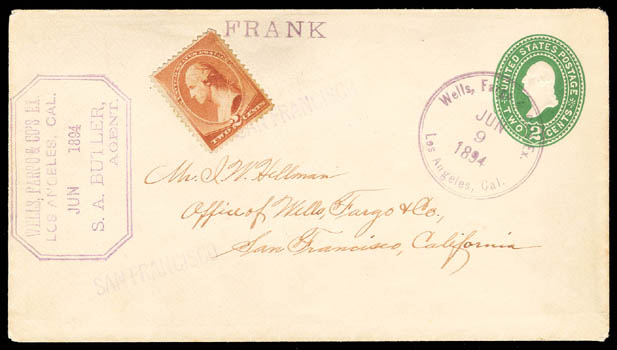



Lot
235 
The 1894 Pullman Strike. Lot of eleven covers relating to the Pullman strike including four covers with the "Wells, Fargo & Co. Butler, Agent" octagon handstamp & straight line "Frank" handstamp, three of the four with Los Angeles circular handstamp of Wells, Fargo & Co., last with Kansas City duplex postmark, plus one cover with Wells, Fargo & Co./Santa Barbara/Agent oval provisional handstamp, a few of the covers seem to be during the period but not strike carried items, Very Fine, a great lot requiring further research with lengthy analysis from Dr. Robert Chandler of the Wells Fargo Historical Department. Estimate $1,000 - 1,500.
George Pullman (1831-97) was the inventor of the Pullman sleeping car. When a Pullman car was attached to the funeral train carrying Abraham Lincoln's body, demand for Pullman's product surged, and the Pullman Sleeping Car Company grew quickly.
George Pullman and architect Solon Beman built the town of Pullman for his employees in Chicago, near 111th street. The town of Pullman was a planned community, with schools, theaters, library, hotel, all operated by the Pullman Sleeping Car Company.
When the fortunes of the company declined in 1894, Pullman slashed wages by 25 percent. However, he neglected to lower the rents or cost of groceries in the company town. A delegation of workers went to meet with Pullman and ask him to reduce these costs - the next day, these men were fired. His workers went on strike, aided by Eugene Debs' American Railway Union. Workers refused to handle any train with Pullman cars attached. In order to ensure that the mail on those trains would not be delayed, President Cleveland sent federal troops to break the strike.
During the turbulent times the mails were interrupted, which gave rise to these scarce strike covers. The strike finally was crushed and ended on August 2nd. All Pullman employees were then required to sign a statement that they would never attempt to join a union.
Realized: $2,700
